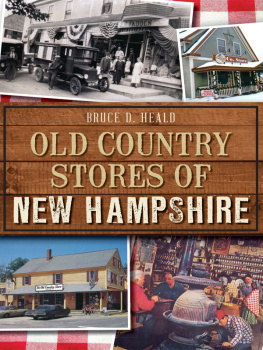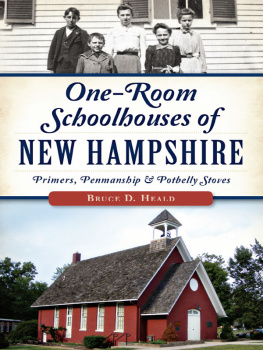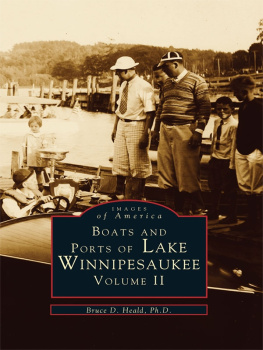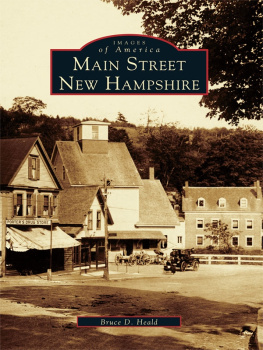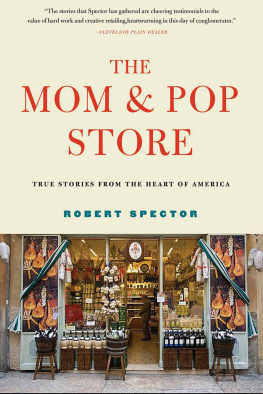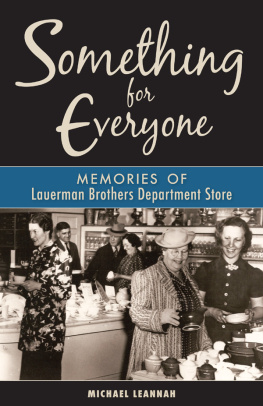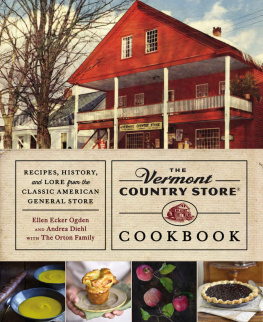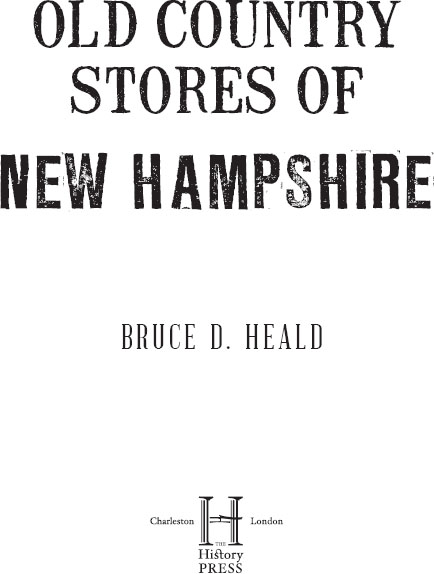

Published by The History Press
Charleston, SC 29403
www.historypress.net
Copyright 2013 by Bruce D. Heald
All rights reserved
Front cover, top left: Faddens General Store, N. Woodstock. Top right: The Ashland Common Man Company Store, Ashland. Bottom: The Old Country Store, Moltonborough.
First published 2013
e-book edition 2013
Manufactured in the United States
ISBN 978.1.62584.049.3
Library of Congress Cataloging-in-Publication Data
Heald, Bruce D., 1935
Old country stores of New Hampshire / Bruce Heald.
pages cm
Includes bibliographical references.
print edition ISBN 978-1-60949-981-5
1. General stores--New Hampshire--History. 2. Country life--New Hampshire--History. 3. New Hampshire--Commerce--History. 4. New Hampshire--Social life and customs. I. Title.
HF5429.4.N37 H 381.14--dc23
2013010886
Notice: The information in this book is true and complete to the best of our knowledge. It is offered without guarantee on the part of the author or The History Press. The author and The History Press disclaim all liability in connection with the use of this book.
All rights reserved. No part of this book may be reproduced or transmitted in any form whatsoever without prior written permission from the publisher except in the case of brief quotations embodied in critical articles and reviews.
Contents
Acknowledgements
I would like to extend my appreciation to the following people and organizations that made this history possible: Maxine and Brenda Aldrich, John and Glenn Anzaldi, Vinny Bianco, Steve and Nancy Bleiler, Greg Bolton, Ray Boutin, Calafs, Maryanne Canfield, Lois Carmody, David and Debra Chouinard, Kenneth Cushing, Jennie Eastman, Jim Fadden, Carol Foord, Nancy B. Foster, Freedom Historical Society, Roselyn Grossholz, Majorie Gene Harkness, Jim Harrison, Harrisville Historical Society, Greg and Teri Heppe, Deborah Herrington, Steve Holden, Edward S. Leonard, Nancy and Thomas Lindsey, Mike and Nancy Lusby, Paul and Marilyn McGuire, Meredith Historical Society, Steve Merrill, Moultonborough Public Library, Russell Partras, Lloyd and Dorothy Robie, Miranda Sandahl, Sandwich Historical Society, Michael Shattuck, Lois R. Shea, Pat and Bill Simon, Karen Tolman, Tuftonboro Public Library and Zebs General Store.
Introduction
The romance and enchantment of a general store begin when you enter and sniff the deep aroma of many spices, tobacco and the stove with its burning fragrance so distinct it can dissolve the years off any aging country boy. Not just any store in the village could muster this fragrance simply because most everything sold in other stores is packaged.
The general stores bouquet came from its huge coffee mill, as bright red as a fire engine; its great tin canisters of bulk tea; and a vast cabinet of lesser canisters containing cinnamon bark, allspice, cloves and nutmeg seeds from which emanated the combined incense of India and the other spice countries. Now add to this a mild dose of kerosene tinged strongly with salt salmon and dried cod.
This was only the beginning, not the sum total, of the general stores fragrance. Modifying it were the milder and quite indescribable smells of unbleached muslin and the display of rubber and felt boots, buckle rubbers and moccasins. Combining with these was the pungency of pounds of plug tobacco, each cut marked with a tin tag denoting Spearhead and Everyday Smoke, and the small open barrel labeled Pittsburgh Stogies. These were the major balms and musky aromas that blended to produce the heavenly redolence of the general store.
There were no signs to designate the various departments. You had to look, and in looking you could find that there was, spread before your eyes, almost everything that man, woman or child could need. Hence, cant dogs stood in a corner next to the yard goods. Flyspecked straw hats and new woolen mittens were suspended on a wire above the shelves of patent medicines, whose labels testified to as powerful a belief in miracles as if the bottles had contained vitamins instead of painkillers and pectorals and invigorators.
What were truly important among the general stores departments were the village post office and the village forum in the shape and style of a box-stove, a couple of chairs and a box of sawdust.
It seemed customary that most of the men who socialized at the store performed one of three talents very well. They could whittle, chew tobacco and, of course, play checkers.
Jim Harrison reminisces these talents in his book Country Stores with the following memories:
Whittling was an aimless diversion that often served merely to prevent the knife handler from having to look up while discussing matters at hand. Using razor sharp Barlows, most whittlers just made long, thin shavings that curled up around their brogan-clad feet.
Some of the craftsmen would cut out crude forms and faces, only to smooth them out again, but most found satisfaction in making long, burnished surfaces.
Chewing tobacco cultivated some crude habits in the store, thus signs were posted. Harrison reveals the following excerpts:
Signs saying, If You Spit on Your Floor at Home, Go Home and Spit and Smokers and Chewers Please Spit on Each Other and Not the Stove were prominently displayed, but never taken seriously by tobacco-chewing customers. Sandboxes near the stove and brass spittoons did their part but could not remove the temptation to spit elsewhere. A tolerant storeowner, who sold the tobacco in the first place, was obliged to maintain the arena for the mouth-muscled activities of the participants.
The chance to hit the hot stove with a mouthful of tobacco juice and hear that sizzling zing was too tempting to pass up, especially for beginning chewers.
Possibly the more popular moments of relaxation were spent in playing checkers and the related game, reverse checkers, usually known as give away. Regular locals would gather in the store and play contentedly by the hour. Little conversation was exchanged, but all who were present enjoyed themselves, especially the players.
For the past fifty years, I have had a love affair with the old country store. A visit was a social event. We picked up the mail, groceries, a new pair of shoes and a pair of gloves. Dont forget the kitchen and farm tools. But times have changed, and the American spirit has changed. Convenience stores and supermarkets are replacing the village store. There appears to be a disregard for quality, and disposable items and quick-wrap foods are its replacements. Today, methods of purchasing stock have greatly changed as well. Gone are the old-time peddlers and traveling salesmen who spent days on the road and slept at local inns.
Now many of the old buildingsstores, barns, linen and textile millsare either abandoned or torn down to be replaced with a mall, office building or parking lot. There goes the old railroad depot, which was the envy of the small-town landscape.
Country Stores also addresses the ageless treatise on the old buildings:
Before pulling down a building in pleasing decay, it should be looked at three timesto be sure first, that it has no virtues in itself that will be sadly missed. Second, that it will not be missed as an enchantment of its present surroundings; third that it might not form a useful point of focus, whether by agreement or by way of contrast in future surroundings
Next page
